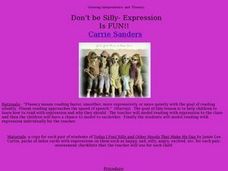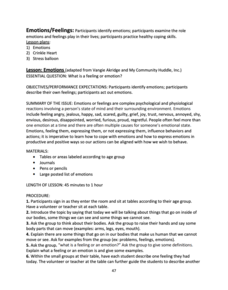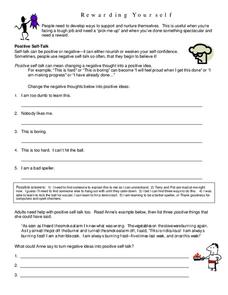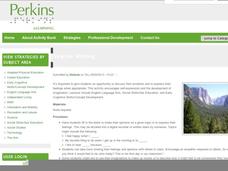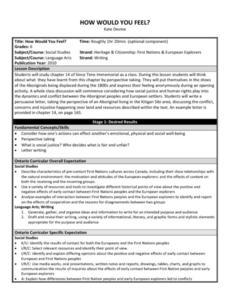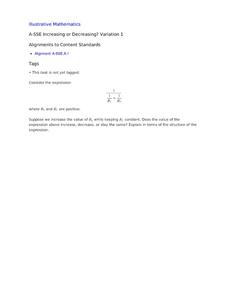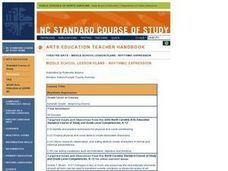Curated OER
Feelings and Emotions
Students discuss and write about different feelings they or someone else may have. In this feelings lesson plan, students discuss different ways they express their feelings. Then they get a picture with someone who is demonstrating a...
Curated OER
Compliments and Feelings
How do you feel when you get a compliment? Give a compliment? After modeling how to make explicit compliments (“I like the way . . .”) ask class members to practice saying nice things about themselves and others, and to consider how...
Kids' Pages
Feelings Matching 2
What does it look like when someone is feeling sad, worried, hungry, or happy? These are some of the emotions that your youngsters will identify in a simple matching activity.
Curated OER
Don't Be Silly–Expression is Fun!
As children observe the teacher reading Today I Feel Silly and Other Moods That Make My Day, they take note of the role punctuation plays in the emotion or expression used. They then take turns reading a book with a partner so they can...
Curated OER
It's All About Expression: Growing Independence and Fluency
In an engaging anticipatory set, the teacher uses several different strategies to activate prior knowledge about reading with expression, including using sentence strips (that must be prepped ahead of time) to show different moods. The...
San Diego County District Attorney
Emotions/Feelings
Three lessons delve deep into the topic of feelings and the importance of expressing one's emotions. Through grand conversation, hands-on learning experiences, and reflective writing, scholars interpret the ups and downs of everyday...
Flourish N Thrive Counseling
A Volcano in My Tummy (Helping Children to Handle Anger)
Sometimes it's hard for kids to express their anger appropriately, or to understand what is happening to their bodies when they feel angry. An insightful instructional activity about anger management can help them identify angry...
J. Paul Getty Trust
Expressing Emotions through Art Lesson 4—Everybody Celebrates
Learners create a celebratory hat after viewing images of artwork depicting people celebrating an event. In this artistic perception lesson plan, students discover why people celebrate their accomplishments and how to express feelings...
Nemours KidsHealth
Stress: Grades 9-12
Everyone feels stress from time to time, but how can you move past it? A seven-page packet of activities guides high schoolers through the process of recognizing and managing their stress. The resource includes discussion topics, a quick...
Missouri Department of Elementary
Happy, Sad, Scared and Mad: All Belong To Me
"What are feelings?" and "Why are feelings important to understand?" are the essential questions of a lesson that boosts self-awareness. Scholars discuss the four basic emotions—happy, sad, scared, and mad—in preparation for a creative...
J. Paul Getty Trust
Expressing Emotions through Art Lesson 3—Everybody Works Together
See how art can communicate the idea of working together with your class. They will view art and describe space, color, shape, and lines in art. Then they will overlap in their art to show a sense of space. In the end, they will be able...
Overcoming Obstacles
Respect
A social-emotional lesson focuses on respect. Scholars define the term and puzzle out the word. Pupils give examples of respect they observe at home, at school, and in the community. Cards showcase scenarios in that participants identify...
Overcoming Obstacles
Empathy
A activity boosts relationship skills with a focus on empathy. Scholars define it, offer examples, and practice showing empathy with scenario cards. Five steps assist class members in empathizing in the classroom, home, and community.
Perkins School for the Blind
Learning to Express Myself
Expressing one's wants and needs is vital for learners of any age or ability level. Young children with visual impairments and intellectual disabilities practice asking for preferred items, foods, or activities in a structured manner....
Project B.A.S.I.C. Child Development Specialist and Child Care Consultation
Better Attitudes and Skills in Children
Little kids often have very big feelings, and need help expressing them. A set of social emotional lessons provide tangible ways for young elementary learners to visualize their emotions, focus on clear communication, and channel their...
University of Washington
Rewarding Yourself
Everyone experiences negative self-talk from time to time, but how can youngsters learn to take it easy on themselves? Use an activity that focuses on talking positively to oneself, including giving yourself compliments and spending time...
Perkins School for the Blind
Encouraging Students Who are Blind or Visually Impaired to Express Their Feelings and Explore Imagination
Being expressive in a creative, empathetic, or imaginative way is not only fun, it builds good pre-writing and communication skills. Learners with visual impairments have a roundtable discussion session where several sentence frames are...
Curated OER
How Would You Feel?
Sixth graders put themselves in the shoes of aborigines who were displaced from their homes in the 1800s by Europeans who came in and took their land from them. They discuss the social injustices suffered by these people, and write a...
Curated OER
Lesson: A Special Place
Everybody has a special place they like to go. I hang out on top of the fridge, for example. Upper graders analyze the painting Mountain Lake, in terms of technique, style, and imagery. They then write or draw a place that expresses...
Curated OER
Increasing or Decreasing? Variation 1
Your algebra learners analyze the value of an algebraic expression to decide if it will increase, decrease, or stay the same when one variable is changed as the others stay constant. Their collaborative efforts culminate with a written...
Scholastic
Writing Letters of Gratitude
A lesson begins with a discussion on gratitude—what does it mean, and for who are learners thankful? Scholars share their thoughts and feelings then choose a community worker to which they wish to share their gratitude. Writers compose a...
Curated OER
Rhythmic Expression
Students discover movement and expression to music/sound through a series of teacher-led exercises and role plays. This lesson is ideal for the middle school drama class with possibilities for adaptation to any level of drama or general...
Curated OER
Poems "I Feel Happy"
Second graders discuss various things that make him/her happy. In this I feel happy lesson, 2nd graders express feelings in a poem. Students reflect on the poems they have written.
Curated OER
Reading: Expressions Using the Word "Cold"
In this idiomatic expressions worksheet, students read a one page text that gives the meaning and origins of expressions using the word "cold" such as "cold fish", "cold shoulder" and "out in the cold". Students answer 5 matching...





